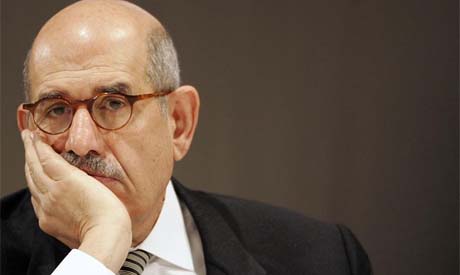 Following the election of the Muslim Brotherhood's Mohamed Morsi as Egypt's first freely-elected president, the identity of Egypt's incoming prime minister remains open to question – as does his ability to freely appoint a new government.
Following the election of the Muslim Brotherhood's Mohamed Morsi as Egypt's first freely-elected president, the identity of Egypt's incoming prime minister remains open to question – as does his ability to freely appoint a new government.
Three public figures – opposition leader Mohamed ElBaradei, veteran central banker Farouk El-Okdah and Deputy PM Hazem El-Beblawi – have all recently been touted in the press as possible nominees.
None of them, however, are expected to be appointed by Morsi, since Egypt's political forces – especially Islamist ones – have serious reservations about all three. Meanwhile, political forces also have different views on the prime minister's right to appoint cabinet members.
ElBaradei, a former head of the International Atomic Energy Agency (IAEA) and a leading supporter of last year's Tahrir Square uprising, saw his presidential bid last opposed by Islamist forces, who repeatedly criticised both his political views and history. Nor has the Islamist attitude towards ElBaradei changed.
When asked about the prospect of seeing the 70-year-old ElBaradei appointed prime minister in an interview with Egyptian independent daily Al-Shorouk on Saturday, prominent Salafist preacher Yasser Borhamy said: "I don't think ElBaradei is the right man at this juncture."
"We hope the forthcoming administration will be a government of technocrats; ElBaradei is a politician, who has a history in Iraq that we are against," added Borhamy, vice president of the Salafist Calling, the political arm of which is Egypt's prominent Nour Party.
Persistent rumours suggest that ElBaradei, while directing the IAEA, falsely wrote in an official report that Saddam Hussein's Iraq boasted weapons of mass destruction. The report, say detractors, provided the US with a justification – erroneously as it turned out – for its 2003 invasion and occupation of the country.
Just before the US launched its war on Iraq, ElBaradei publicly declared that there was not "any indication of nuclear-related prohibited activities at any inspected [Iraqi] sites." His Islamist critics, however, continue to accuse him of paving the way for the destructive US invasion.
"We also refuse his attempts to internationalise the cause of the Nubians [who were largely displaced from their traditional homeland in Upper Egypt under late Egyptian president Gamal Abdel-Nasser], even though the Nubians themselves did not want their cause internationalised," Borhamy said.
Borhamy's opinion of ElBaradei was largely echoed by Younes Makhioun, a leading Nour Party official, and by Egypt's Al-Gamaa Al-Islamiya, the political arm of which is the Building and Development Party.
Al-Gamaa would reject ElBaradei's nomination as prime minister, along with that of either El-Oqda or El-Beblawi, according to group officials.
Al-Gamaa spokesman Tarek El-Zomor declared in a recent statement that El-Okdah, El-Beblawi and former finance minister Samir Radwan "cannot be considered for the top government post because they're dignitaries who served under the Mubarak regime."
Morsi spokesman Yasser Ali, meanwhile, told Al-Ahram's Arabic-language news website that Egypt's new president had not discussed the composition of his incoming government with El-Oqda. Other names, meanwhile, have yet to emerge as potential nominees, although Ali says they will be revealed by early next week.
The acting interim prime minister, Kamal El-Ganzouri, is expected to remain in charge of the Cabinet until a new one is appointed.
Along with the new PM's identity, the precise mechanism for drawing up the new cabinet, too, has yet to be clarified.
Earlier this month, it was reported that Morsi and Egypt's military council (which temporarily assumed executive authority upon Mubarak's ouster) had agreed that the military council would be responsible for appointing the heads of sensitive ministries – including the interior, defence, information and foreign affairs portfolios – while the president and prime minister would appoint the rest.
Notably, Article 53 of the recent constitutional addendum states that the current head of the SCAF is to act as commander-in-chief of the armed forces and minister of defense until a new constitution is drafted.
Yet according to political expert Khalil Marie, Article 56 of last year's Constitutional Declaration (issued by the military council in the wake of last year's revolution and approved via popular referendum) gives the president the authority to appoint the prime minister, along with all other cabinet members.
Other legal experts are of the same opinion, including Judge Bahaa Abu-Shaka, vice-president of Egypt's liberal Wafd Party. Abu-Shaka was recently quoted as saying that, according to last year's Constitutional Declaration, Egypt's president "has the right to hire and fire all of his ministers."



